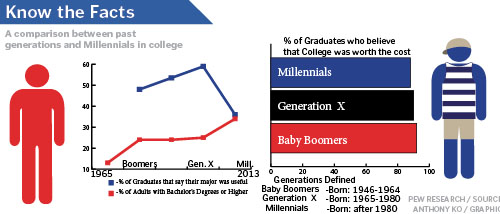For as long as he could remember, junior Ben Figueroa has been fascinated by fire.
“It’s something so mysterious yet also completely understood by science,” Figueroa said. “We know what it is, but there’s something about it that’s captivating and awe-inspiring.”
 Figueroa said his fascination has led him to pursue a career involving fire. As of now, he is considering blacksmithing, which is working with metals, and film pyrotechnics, which is working with special effects such as explosions and fireworks. Because neither of these occupations requires a college degree, Figueroa has decided to not attend college after high school.
Figueroa said his fascination has led him to pursue a career involving fire. As of now, he is considering blacksmithing, which is working with metals, and film pyrotechnics, which is working with special effects such as explosions and fireworks. Because neither of these occupations requires a college degree, Figueroa has decided to not attend college after high school.
Figueroa’s post-high school plans might be seen as surprising due to the greater-than-ever cost of not going to college according to a 2013 Pew Research population survey. Millennial college graduates between ages 25 and 32 who are working full time earn about $17,500 more annually than young adults with only a high school diploma. The pay gap between the two groups was significantly smaller in previous generations.
Todd Iler, Assistant Director of Admissions at Purdue, said there are many reasons for this phenomenon.
He said, “A big part of earning a degree is proving (to employers) that you’ve learned and that you can do what you say you want to do. It is proving that you can be presented with problems and information, and you can solve it and organize it in a logical fashion.”
In addition, Iler said that going to college allows students to connect with people they can network with in the future. At Purdue specifically, students are also able to learn about other cultures and recognize how things work on a global scale due to the campus’ diversity, which is very important to the modern business world.
Figueroa said he does not know anyone else at CHS who does not plan to go to college like him and thinks this phenomenon is strange because there are many options, mainly blue-collar jobs, that don’t require college degrees.
While degrees are available in both blacksmithing and film, Figueroa said he thinks employers will judge prospective employees on their talent rather than a degree in the two fields.
He said, “In blacksmithing, if you are trained, know what you are doing, you’re a good craftsman, you’re talented, if you’re a good artist, then that is your measure of performance, not how you were trained or who trained you. The same is true with film.”
 Figueroa also said he decided to enter the work force after high school because of his personal learning style, which is suited towards more hands-on learning.
Figueroa also said he decided to enter the work force after high school because of his personal learning style, which is suited towards more hands-on learning.
According to him, “The way I learn isn’t suited towards sitting in a classroom and being told what to think,” Figueroa said. “I am pretty narcissistic. If I’m sitting in class, and someone is just talking at me, I feel like, ‘Oh I’m so much smarter than this person. Why are they trying to tell me what to think or what to do?’ But in a situation where it’s hands-on, I can clearly see that they have a better grasp of what to do than I do, so I can respect that more.”
However, Iler said there are many hands-on learning experiences available to students in college.
“You’ll do an incredible amount of hands-on learning (in college), especially as you progress within your program,” he said. “At Purdue we have over 2,000 different types of undergraduate research programs and projects going on. These use the skills and the programs you’re learning about in the classroom while you’re here to apply what you’re learning in the real sense.”
Figueroa also said he realizes that he will not be able to have the transition from being a teenager to adult that college students will have.
“I would have to go straight out into the labor pool,” Figueroa said. “I don’t get that transition period of college where you’re kind of an adult. College is good for the experience because you get to go and learn about the world and learn about what being independent is before you have to rely totally on yourself.”

































![AI in films like "The Brutalist" is convenient, but shouldn’t take priority [opinion]](https://hilite.org/wp-content/uploads/2025/02/catherine-cover-1200x471.jpg)









































![Review: “The Immortal Soul Salvage Yard:” A criminally underrated poetry collection [MUSE]](https://hilite.org/wp-content/uploads/2025/03/71cju6TvqmL._AC_UF10001000_QL80_.jpg)
![Review: "Dog Man" is Unapologetically Chaotic [MUSE]](https://hilite.org/wp-content/uploads/2025/03/dogman-1200x700.jpg)
![Review: "Ne Zha 2": The WeChat family reunion I didn’t know I needed [MUSE]](https://hilite.org/wp-content/uploads/2025/03/unnamed-4.png)
![Review in Print: Maripaz Villar brings a delightfully unique style to the world of WEBTOON [MUSE]](https://hilite.org/wp-content/uploads/2023/12/maripazcover-1200x960.jpg)
![Review: “The Sword of Kaigen” is a masterpiece [MUSE]](https://hilite.org/wp-content/uploads/2023/11/Screenshot-2023-11-26-201051.png)
![Review: Gateron Oil Kings, great linear switches, okay price [MUSE]](https://hilite.org/wp-content/uploads/2023/11/Screenshot-2023-11-26-200553.png)
![Review: “A Haunting in Venice” is a significant improvement from other Agatha Christie adaptations [MUSE]](https://hilite.org/wp-content/uploads/2023/11/e7ee2938a6d422669771bce6d8088521.jpg)
![Review: A Thanksgiving story from elementary school, still just as interesting [MUSE]](https://hilite.org/wp-content/uploads/2023/11/Screenshot-2023-11-26-195514-987x1200.png)
![Review: "When I Fly Towards You", cute, uplifting youth drama [MUSE]](https://hilite.org/wp-content/uploads/2023/09/When-I-Fly-Towards-You-Chinese-drama.png)
![Postcards from Muse: Hawaii Travel Diary [MUSE]](https://hilite.org/wp-content/uploads/2023/09/My-project-1-1200x1200.jpg)
![Review: "Ladybug & Cat Noir: The Movie," departure from original show [MUSE]](https://hilite.org/wp-content/uploads/2023/09/Ladybug__Cat_Noir_-_The_Movie_poster.jpg)
![Review in Print: "Hidden Love" is the cute, uplifting drama everyone needs [MUSE]](https://hilite.org/wp-content/uploads/2023/09/hiddenlovecover-e1693597208225-1030x1200.png)
![Review in Print: "Heartstopper" is the heartwarming queer romance we all need [MUSE]](https://hilite.org/wp-content/uploads/2023/08/museheartstoppercover-1200x654.png)




